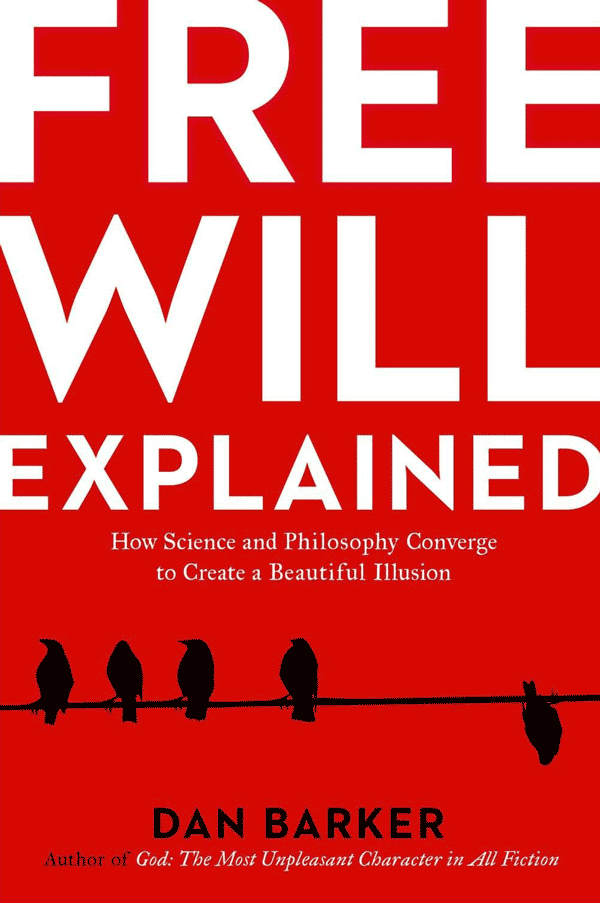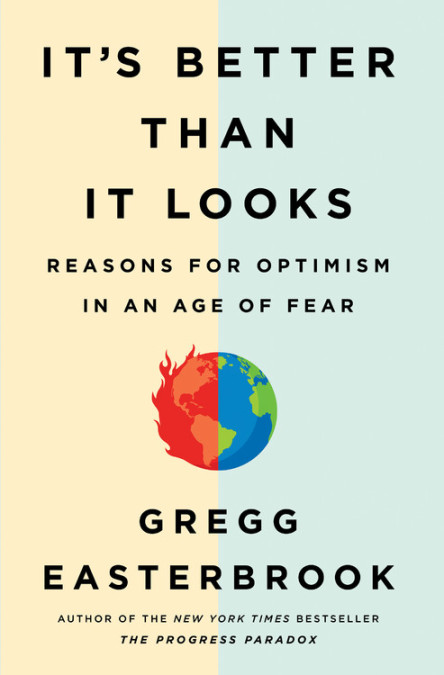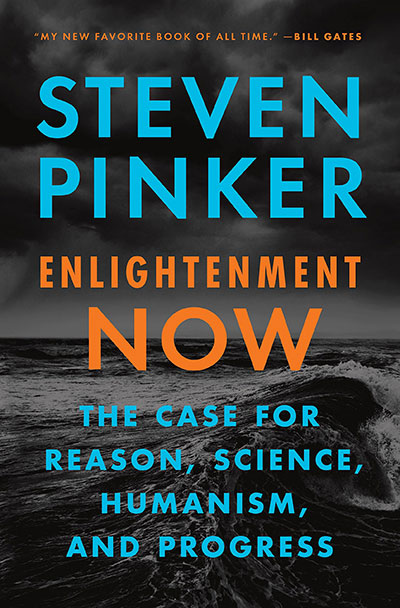February 28, 2018
A review of It’s Better Than it Looks: Reasons for Optimism in an Age of Fear by Gregg Easterbrook (Public Affairs. February 2018. ISBN 9781610397414.) A shorter version of this review was published in the Wall Street Journal on February 28, 2018 under the title “Why Things Are Looking Up”.
Though declinists in both parties may bemoan our miserable lives, Americans are healthier, wealthier, safer and living longer than ever.
In his 1971 book A Theory of Justice, the Harvard philosopher John Rawls argued that in the “original position” of a society we are all shrouded in a “veil of ignorance” of how we will be born—male or female, black or white, rich or poor, healthy or sick, slave or free—so society should be structured in such a way that laws do not privilege any one group because we do not know which category we will ultimately find ourselves in.
Writing during a time when civil unrest over centuries of injustice was spilling out into the streets in marches and riots, Rawls’ work was as much prescriptive as it was descriptive. But 45 years later, at a 2016 speech in Athens, Greece, President Barack Obama affirmed that a Rawlsian society was becoming a reality: “If you had to choose a moment in history to be born, and you did not know ahead of time who you would be—you didn’t know whether you were going to be born into a wealthy family or a poor family, what country you’d be born in, whether you were going to be a man or a woman—if you had to choose blindly what moment you’d want to be born you’d choose now.” As Obama explained to a German audience earlier that year: “We’re fortunate to be living in the most peaceful, most prosperous, most progressive era in human history,” adding “that it’s been decades since the last war between major powers. More people live in democracies. We’re wealthier and healthier and better educated, with a global economy that has lifted up more than a billion people from extreme poverty.” (continue reading…)
Comments Off on Realizing Rawls’ Just Society
February 23, 2018
A review of Steven Pinker’s Enlightenment Now: The Case for Reason, Science, Humanism, and Progress (Viking, 2018, ISBN 978-0525427575). This review appeared in Science in February 2018.
How much better can you imagine the world being than it is right now? How much worse can you imagine the world being than it is right now?
For most of us, it is easier to imagine the world going to hell in a handbasket than it is to picture some rosy future, which explains why there are far more dystopian and apocalyptic books and films than there are utopian. We can readily conjure up such incremental improvements as increased Internet bandwidth, improved automobile navigation systems, or another year added to our average lifespan. But what really gets imaginations roiling are the images of nuclear Armageddon, AI robots run amok, or terrorists mowing down pedestrians in trucks. (continue reading…)
Comments Off on Reason (and Science) for Hope
February 6, 2018
Foreword to Free Will Explained: How Science and Philosophy Converged to Produce a Beautiful Illusion, by Dan Barker (Sterling. 2018. ISBN 9781454927358).

In 1985, the physiologist Benjamin Libet conducted a series of experiments that involved taking EEG readings of subjects’ brains engaged in a task that required them to press a button at random intervals whenever they felt like it during the session. Results: several seconds before the “decision” was consciously made by the subject, the brain’s motor cortex was activated.1 The neuroscientist John-Dylan Haynes employed fMRI brain scans in a 2011 study in which subjects inside the scanner were instructed to press one of two buttons whenever they wanted while observing a series of random letters. The subjects were told to verbally report which letter was on the screen when they “decided” to press the button. Results: the time between brain activation and conscious awareness of a “choice” was several seconds, and in some cases a full seven seconds.2
In these studies, and others, scientists measuring subjects’ brains know which decision they would make before the subjects themselves know it! That is spooky, and if these results don’t bother you then you’re not thinking hard enough about them. What they imply is that we are not free to choose in the way we think we are. We feel free, but that’s just what our conscious self believes because it doesn’t know about the inputs feeding into it from below that have already made the choice. As the neuroscientist Sam Harris articulated it in his widely-read book Free Will, “Our wills are simply not of our own making. Thoughts and intentions emerge from background causes of which we are unaware and over which we exert no conscious control. We do not have the freedom we think we have.”3 (continue reading…)
Comments Off on Finding Freedom in a Determined Universe
December 22, 2017
A Response to George Ellis’s Critique of My Defense of Moral Realism
This article appeared in Theology and Science in December 2017.
I am deeply appreciative that University of Cape Town professor George Ellis took the time to read carefully, think deeply, and respond thoughtfully to my Theology and Science paper “Scientific Naturalism: A Manifesto for Enlightenment Humanism” (August, 2017),1 itself an abbreviation of the full-throated defense of moral realism and moral progress that I present in my 2015 book, The Moral Arc.2 As a physicist he naturally reflects the methodologies of his field, wondering how a social scientist might “discover” moral laws in human nature as a physical scientist might discover natural laws in laboratory experiments. It’s a good question, as is his query: “Is it possible to say in some absolute sense that specific acts, such as the large scale massacres of the Holocaust, are evil in an absolute sense?”
Pace Abraham Lincoln, who famously said “If slavery is not wrong, then nothing is wrong,”3 I hereby declare in an unequivocal defense of moral realism:
If the Holocaust is not wrong, then nothing is wrong.
Since Professor Ellis is a physicist, let me approach this defense of moral realism from the perspective of a physical scientist. It is my hypothesis that in the same way that Galileo and Newton discovered physical laws and principles about the natural world that really are out there, so too have social scientists discovered moral laws and principles about human nature and society that really do exist. Just as it was inevitable that the astronomer Johannes Kepler would discover that planets have elliptical orbits—given that he was making accurate astronomical measurements, and given that planets really do travel in elliptical orbits, he could hardly have discovered anything else—scientists studying political, economic, social, and moral subjects will discover certain things that are true in these fields of inquiry. For example, that democracies are better than autocracies, that market economies are superior to command economies, that torture and the death penalty do not curb crime, that burning women as witches is a fallacious idea, that women are not too weak and emotional to run companies or countries, and, most poignantly here, that blacks do not like being enslaved and that the Jews do not want to be exterminated. Why? […]
To continue reading this article, download the PDF.
Download the PDF
Comments Off on Mr. Hume: Tear. Down. This. Wall.
August 9, 2017

The author in the 1984 Race Across America (RAAM), crossing from Arizona into Utah through the Virgin River Gorge.
Among cycling aficionados of my generation, Peter Yates’ and Steve Tesich’s 1979 film Breaking Away was a welcome vehicle to convey the elegance and complex strategy of our sport to an American audience largely oblivious to its beauty and nuances. Of course, like most sports films, it was a metaphor for something deeper, in this case a coming of age story of a young man struggling to break away from the provincialism of family and friends, along with a morality tale about how everyone lies a little and some people cheat a lot.
In Knowing the Score, King’s College philosopher David Papineau uses specific sports as metaphors for and lessons about many of the most important and contentious issues in philosophy and life. In his chapters on cycling, for example, he confesses his ignorance while watching the 2012 Olympic road race as to why four women cyclists from different countries would work together after their break away from the peloton. Papineau finds an answer in game theory, the analysis of competition and cooperation between rational actors in a conflict situation. The prisoner’s dilemma model is the most famous example: you and another prisoner are arrested for a crime with the following options: (1) If both of you remain silent then you each receive one year in jail; (2) If you confess but the other person does not, then you go free and he gets three years; (3) If the other prisoner confesses and you don’t, then you receive the three-year penalty while he goes free; (4) If you both confess then you each get two years. What should you do? Research shows that when the game is played just once, or over a fixed number of rounds without the players being allowed to communicate, defection (confessing) is the common strategy. But when the game is played over an unknown number of rounds the most common strategy is “tit-for-tat,” where you begin by cooperating and then do whatever the other player does. Even more cooperation can be induced in a “Many Person Dilemma” in which one player interacts with several other players, and in which players are allowed to accumulate experience with the other players in order to establish trust. Here cooperation trumps competition, selflessness overcomes selfishness. (continue reading…)
Comments Off on Life’s Score






![Knowing the Score: What sports can teach us about philosophy (and what philosophy can teach us about sports) [BOOK COVER]](https://www.skeptic.com/eskeptic/2017/images/17-08-09/knowing-the-score-cover.jpg)